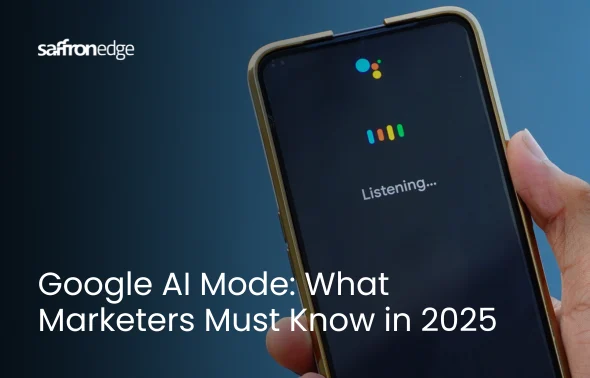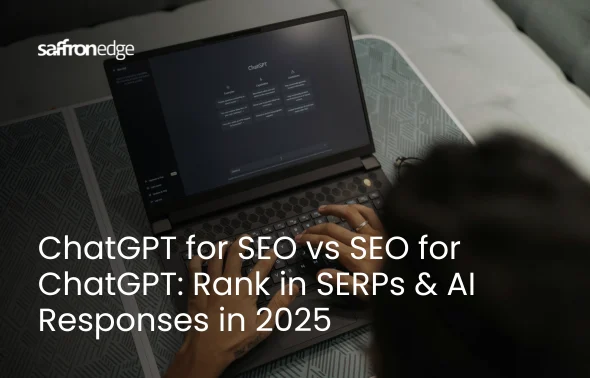Every few years, someone wakes up and declares, “SEO is dead.” You may have heard it a thousand times during the rise of social media, when voice search emerged, and again when zero-click results began to dominate Google.
Now, the question on everyone’s mind is: Will AI replace SEO?
The reason why it feels different this time is because AI isn’t just another feature; it’s a complete shift in how people search, consume, and trust information.
Tools like ChatGPT, Perplexity, and Google’s own AI Overviews are not just competing with SEO; they’re redefining what “search” even means.
The Short Answer
Cut straight to the point, no, AI will not replace SEO. But it will never look the same again.
AI isn’t killing SEO. It’s reshaping it. And if the question is “Will AI replace SEO?” or “Will SEO be replaced by AI?” You’re really asking whether the strategies we’ve used for the last decade will still hold up in this AI-led search behavior.
The truth is, AI is pushing search in a new direction; away from just keywords and links and toward credibility, trust, and human perspective. Now, let me explain why.
Why SEO Won’t Disappear?
We’ve been in the SEO and marketing space long enough to see it evolve.
Remember the days of keyword stuffing, when getting ranked meant sprinkling a phrase a hundred times on a page.
That doesn’t work anymore because Google got smarter. And here’s the thing: AI is going through the same journey.
AI needs structured, high-quality content to give answers. Generative engines don’t magically create knowledge; they pull from the very websites that SEO has been optimizing for years.
If businesses stop optimizing, AI won’t have reliable sources to pull from. That’s why SEO can’t die.
Also, search intent doesn’t vanish just because AI exists. People still have problems, still type queries, and still want to compare, evaluate, and trust before buying. AI can answer, but it can’t fully replace the discovery process humans go through.
And lastly, brands need visibility. Whether through Google or AI-driven search, people still need to know who is behind the information. SEO ensures your brand gets that visibility.
Will ChatGPT Replace Google?
The short answer: No, ChatGPT will not replace Google, at least not entirely.

Funnily enough, even asked ChatGPT the same question, “Will ChatGPT Replace Google?”. Its own answer was a clear NO. Here’s why:
1. Google’s Ecosystem Is Too Deep
-
Google isn’t just a search engine. It also includes Maps, Gmail, YouTube, Android, Chrome, and Ads, all of which are interconnected.
-
Billions of people use these services daily, and that creates lock-in. Even with Microsoft’s backing, ChatGPT doesn’t have this ecosystem reach.
-
Proof: Google processes over 8.5 billion searches daily, while ChatGPT, though massive in adoption, operates as a standalone assistant. Ecosystem dependency ensures Google remains dominant.
2. ChatGPT Struggles With Certain Search Types
-
ChatGPT excels at generating answers, summaries, and explanations.
-
But for transactional, navigational, or local intent (like “best dentist near me” or “cheap flights to Delhi”), Google’s index + business integrations crush it.
-
Proof: Google owns platforms like Google My Business, Google Flights, and Shopping Ads; data layers ChatGPT simply can’t replicate without access.
3. ChatGPT Complements, Not Replaces, Search
-
ChatGPT is redefining how people find information; shifting from “searching” to “chatting.”
-
But instead of replacing Google, it’s pushing Google to evolve with AI Overviews (SGE) and pushing Microsoft Bing forward.
-
Proof: Even Google’s latest AI-first strategy shows they see ChatGPT as competition worth adapting to, not an existential threat. Google integrates AI into search, while ChatGPT experiments with browsing and plugins.
ChatGPT won’t replace Google outright. Instead, it will force Google to evolve faster and coexist as a new way for people to seek answers.
How AI Is Reshaping Search Right Now
That said, the landscape is shifting fast. Let’s talk about Google vs AI for a moment.
Google has always been the gateway to information. But now, with ChatGPT, Perplexity, and even Google’s own AI Overviews (SGE), search isn’t about “ten blue links” anymore. It’s about direct answers.
-
Google SGE: When you type a query, Google shows an AI-generated summary at the top. This reduces clicks to websites because the answer is already there.
-
Bing Copilot & ChatGPT: Instead of links, you get conversational, cited answers.
-
Perplexity AI: It positions itself as an “answer engine,” not a search engine.
What does this mean for us in SEO? Traffic is going to change. Queries that used to bring thousands of visits might now send just a fraction.
AI summaries act like gatekeepers, giving users answers before they ever visit a website.
But here’s the twist: if your content is cited inside those summaries, your brand authority skyrockets. That’s the new SEO opportunity.
Opportunities in the AI + SEO Hybrid Future
See the three big opportunities in this hybrid world:
1. Ranking in AI Summaries
If you structure your content with clear headers, FAQs, and data, AI is more likely to reference it. Think “answer-first” content.
2. Creating Content AI Trusts
AI prefers reliable, cited sources. That means doubling down on E-E-A-T (Experience, Expertise, Authoritativeness, Trustworthiness). Publish insights, original data, and case studies that make your content stand out.
3. Smarter SEO with AI Tools
Using AI tools to analyze competitor keywords, cluster topics, and predict intent. AI doesn’t just change search; it also makes SEO work more efficiently.

Action Plan: Future-Proofing Your SEO
We’ve seen that the traffic suddenly dropped for a few of our clients, but it was also redirected to AI engines.
This is how we ensured that the overall user growth happens from all search engines:
1. Double Down on E-E-A-T
Share your unique expertise, publish your experiences, and add your name, credentials, and perspective to content. AI can summarize, but it can’t replicate your lived experience.
2. Diversify Traffic Sources
Don’t just rely on Google. Build communities, grow newsletters, create podcasts, and leverage LinkedIn or YouTube. Traffic diversity makes you resilient.
3. Treat AI as a Co-Pilot
Use AI to draft outlines, do keyword clustering, and summarize competitor strategies. But still add the human angle AI can’t replicate. That’s where differentiation lies.
4. Optimize for Both SEO + GEO
Keep optimizing for Google (title tags, meta, site speed, backlinks). But also optimize for AI by structuring content with clarity, fact-checking, and including references.
Saffron Edge Perspective
At Saffron Edge, we’ve already started adapting our clients’ SEO strategies to this AI-driven landscape.
When we talk to brands, the biggest fear we hear is: “If AI gives the answers directly, won’t we lose traffic?”
Here’s what we’ve learned:
-
Brands that invest in credibility win citations in AI answers. For example, one of our B2B clients saw their insights being referenced inside AI-generated summaries because their content was backed by real data and thought leadership.
-
Content depth beats content length. Instead of creating 20 surface-level blogs, creating one authoritative, well-structured guide increases the chance of being referenced by AI.
-
Diversification matters. SEO is still central, but we pair it with LinkedIn growth, email marketing, and community-building to ensure clients aren’t overly reliant on Google alone.
From our perspective, AI doesn’t replace SEO; it creates an opportunity for a more holistic approach.
The brands that thrive in the Google vs AI era are the ones that adapt early, blend human creativity with AI tools, and keep trust at the center of their content.
Final Take
So, will AI replace SEO? My answer stays the same: no, AI will not replace SEO. And no, ChatGPT will also not replace Google.
But will SEO be transformed by AI? Absolutely.
We’re moving into a world where “Google vs AI” isn’t the real fight. The real shift is Google + AI vs how users discover information.
And here’s the exciting part: if you adapt now, you won’t just survive the AI wave. You’ll ride it.
Worried whether AI Will Replace SEO?
Unlock strategies to leverage AI for smarter SEO and higher traffic today. Don’t let your rankings drop. Partner with Saffron Edge for SEO strategies that leverage AI to grow your business.
Rank in AI Overviews
Frequently Asked Questions
Will AI replace SEO completely?
No, AI will not replace SEO completely. SEO remains essential for ranking, building trust, and ensuring visibility even in AI-driven search results.
Will SEO be replaced by AI in the future?
SEO will not be replaced by AI, but it will evolve. Businesses must adapt SEO strategies to be cited by AI and remain visible on search engines.
Can AI replace Google for search purposes?
AI cannot replace Google entirely. In the Google vs AI landscape, AI complements search, but Google’s ecosystem and local results keep SEO crucial.
How can SEO survive if AI changes search?
SEO survives AI changes by optimizing content for both traditional search and AI-driven summaries. Structured content, clear references, and E-E-A-T are key.
Will AI replace SEO for businesses entirely?
AI will not replace SEO for businesses entirely. Instead, it reshapes SEO, offering opportunities to rank in AI answers while maintaining Google visibility.
Related Blogs
We explore and publish the latest & most underrated content before it becomes a trend.

Subscribe to Saffron Edge Newsletter!

Rank in AI Overviews



![AI SEO[1]](https://dsi59nxdlf71n.cloudfront.net/media/4imjghvk/ai_seo-1.png?format=webp&w=590&h=378&quality=70&v=1dc23e388cfa450)




